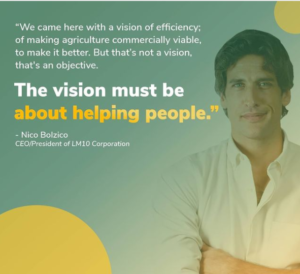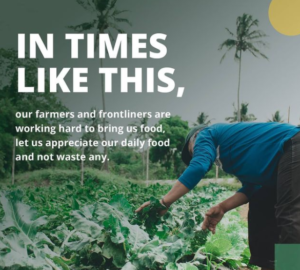Cari amici, oggi voglio parlarvi di Nico Bolzico. E’un giovane imprenditore agricolo e famosissimo nel mio Paese. Non è filippino, perchè è nato in Argentina, ma è come se lo fosse. Era un ragazzo di campagna e ora gestisce la propria azienda specializzata in tecnologia agricola. Sta facendo molto per il mio Paese, che ha un forte potenziale agricolo ma non ha i mezzi. Bolzico è un gran lavoratore, disciplinato nella sua vita ma anche molto simpatico, come si vede su Instagram. Ha una tartaruga domestica di nome Patato alla quale è molto affezionato. E’ un padre premuroso e marito molto innamorato della sua bella moglie, l’attrice filippina Solenn Heussaff. Sono una vera coppia social.

Entrepreneur Nico Bolzico arrived in the Philippines 10 years ago with a vision for Philippine agriculture, something that became actualized with the birth of his company LM10 (named after his favorite football player and fellow Argentinian Lionel Messi).
Since then, LM10 has grown to encompass several livestock, agriculture, and research businesses, and its CEO, Nico himself, has garnered celebrity status thanks to his masterful use of social media, something he uses to shine the spotlight on his true passion: agriculture.
LM10 seeks to provide the Philippine agriculture with the technology and research it needs to modernize agricultural techniques. These will make it sustainable and also improve the quality of life of the millions of workers in the agriculture sector. This covers everything from sustainable waste recycling to lab analyses for feed meals, as well as the use of precision agriculture, which uses data and technology to guide farmers.
At LM10, he leads a team with a collective goal to transform the Philippines into an agriculture-export country. The Philippines, despite being an agricultural country, is also notorious for being the biggest rice importer in the world, which has affected rice farmers around the country.
One way to ensure no farmer gets left behind? Technology.
He thinks that technology is the key for the agricultural culture to strive. At the end of the day, natural resources are limited and its technology that will make them produce more in a more efficient and sustainable way. He also added that there is no agricultural sector without technology.
His vision is based largely on his experiences, which include being raised on a farm in the agriculture-rich Argentina where major exports include wheat, corn, and soya. He shared that the agriculture in Argentina there is much more technology involved. It is because there are bigger parcels of land, so landowners can actually afford the fixed cost agricultural technology and because they have the economies of scale.
The use of technology in farming goes beyond just the machinery. It refers to crop science, geo-mapping, and all kinds of innovation that can optimize harvests for the betterment of local farmers.

But Philippine agriculture has a long way to go before it can catch up to agriculture leaders in the world. Because the farmers don’t get attention and they don’t have access to a lot of things, like internet and financing and a lot of aspects of a business that you need to succeed. And I think that would be step one to give them something as simple as internet and being able to sell what they produce directly to the market so they can make better profit out of it, said Bolzico.
At the end of the day, cooperation and collaboration will be needed from all sectors and services to improve Philippine agriculture, which has the untapped potential to be a major economic player for the country.
He thinks the agriculture sector of the Philippines is so important, and you have so much potential. And everything is here. All the pieces of the puzzle are here. It’s a matter of communicating more and cooperating.

With clients located in remote rural areas from Ilocos Region all the way to General Santos City, reliable communication and internet connection is vital to its business, which is why Globe’s myBusiness product was a perfect fit for LM10.
Its internet products proved essential to a company with clients in far-flung areas, and the cloud solutions system has allowed the team to work at home efficiently despite the pandemic and the multiple typhoons that razed farmlands across the country.
It’s very important for us to be connected because we have different locations, we need information to flow fast in order to make decisions fast. Especially with this pandemic. It’s key to act and adapt very, very fast and without communication, we cannot do that, explained Bolzico.
The challenges presented in 2020 have shown how essential proper communication and coordination are needed to overcome and survive, this year. Whether it’s through an internet connection or cloud-based services, technology has become the lifeblood of every business and industry this year. After all, the internet is now a human right.
It’s very important for producers, the first link of the chain meaning the farmers, to be able to have access to the real market, to know how much their goods are. Because at the end of the day, they are providing the food, said Bolzico. It’s very key that we support that in terms of investing whatever infrastructure needs to the Internet and access needs to farmers in remote areas.




